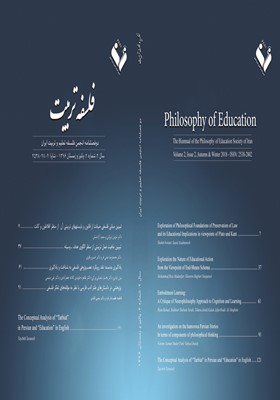تبیین مؤلفههای عدالت آموزشی و تحلیل انتقادی جایگاه آن در گفتمان های ایدئولوژیک سازی و سازندگی
محورهای موضوعی : تاریخ و ماهیت رشته فلسفهٔ تعلیموتربیت، مکاتب و رویکردهای فلسفهٔ تعلیموتربیت قدیم و جدید ،تاریخ اندیشه و عمل تربیتی (سیاستها، برنامهها، اقدامات و...) مفاهیم، گزارهها و نظریههای تربیتی آراء مربیان و فیلسوفان تربیتی روششناسی پژوهشهای تربیتی انواع تربیت مسائل تعلیموتربیت ایران و جهان برنامه درسی و آموزش در رشتههای گوناگونفهیمه اکبرزاده 1 , یحیی قائدی 2 , اکبر صالحی 3
1 -
2 - دانشگاه خوارزمی تهران
3 - دانشگاه خوارزمی
کلید واژه: عدالت آموزشی, گفتمان, ایدئولوژیک سازی, سازندگی, تحلیل گفتمان انتقادی,
چکیده مقاله :
مقاله حاضر، با هدف تحلیل و نقد مؤلفههای عدالت آموزشی در گفتمان های بعد از انقلاب اسلامی با تأکید بر گفتمان ایدئولوژیک سازی و سازندگی، نگاشته شده است. به همین منظور، برخی بیانات مستقیم دولتمردان و برخی متون و مصوبات دولتی و آموزشی در دو دوره مذکور با روش تحلیل گفتمان انتقادی نورمن فرکلاف، مورد تحلیل و نقد قرار گرفت. آنگونه که از تحلیل و تفسیر متون برآمد، گفتمان های مذکور اگرچه پیرامون مقوله عدالت آموزشی، مواضع سیاسی و ارزشی بعضاً متفاوتی داشته اند، اما با نظر به تحلیل متنی و فرامتنی، بیش از هر چیز بر اساس مقوله نیاز و در بُعد عدالت کمی عمل نموده اند. کمبود بودجه، حفظ روابط سلسله مراتبی ، تمرکزگرایی، ابهام و تضاد در نظر و عمل، ضعف در بهره گیری کارکردگرایانه از دین در کنار دیگر افکار، ناآرامی های داخلی و خارجی، تعاملات محدود داخلی و خارجی، محافظه کاری، غالب بودن و ارجح بودن مواضع فکری و ارزشی مراجع بالادستی نظام و بهعنوان مهمترین عامل و مانع نسبت به دیگر موارد، از جمله شاخص ترین محدودیت های درونمتنی و موانع برونمتنی در فراهم آوردن الزامات تحقق عدالت آموزشی خصوصاً در سطح کیفی است، نشانگر ناهمخوانی اهداف و برنامه های مطرحشده با مناسبات و اهداف حقیقی و مدنظر دولت است. نتیجه اینکه اگر ازلحاظ انگیزشی و شناختی در مواضع فکری گروه حاکم بهعنوان منبع اقتدار و سیاستگذاری در کلیه سطوح، تحولی ایجاد نگردد، تغییر در دیگر سطوح، بهعنوان الزاماتی برای تحقق مؤثر عدالت آموزشی، خصوصاً در سطح کیفی، ممکن نخواهد گشت.
The present article has been written with the aim of analyzing and criticizing the components of educational justice in the discourses after the Islamic Revolution with emphasis on the discourse of ideological and constructive. For this purpose, some of the direct statement and some governmental and educational texts and approvals in the two mentioned periods have been studied and criticized by Norman Fairclough’s critical discourse analysis method. As can be seen from the analysis and interpretation of the texts, these discourses, although somewhat different in terms of educational justice, political and value positions, but in terms of textual and hyper-textual analysis, act more on the need and in the dimension of justice. Lack of budget, maintaining relations of hierarchical order, centralism, ambiguity and contradiction in opinion and practice, weakness in functionalist use of religion along with other ideas, internal and external unrest, limited internal and external interactions, conservatism, dominance and superiority of intellectual and value positions of the upper echelons of the system and as the most important factor and obstacle compared to other cases, including the most significant internal constraints and external barriers in providing the requirements for educational justice, especially at the qualitative level and it shows the inconsistency of the goals and programs proposed with the real relations and goals of the government. Consequently, If, in terms of motivation and cognition, there is no change in the intellectual positions of the ruling group as a source of authority and policy at all levels, change at other levels will not be possible as requirements for the effective realization of educational justice, especially at the qualitative level.


